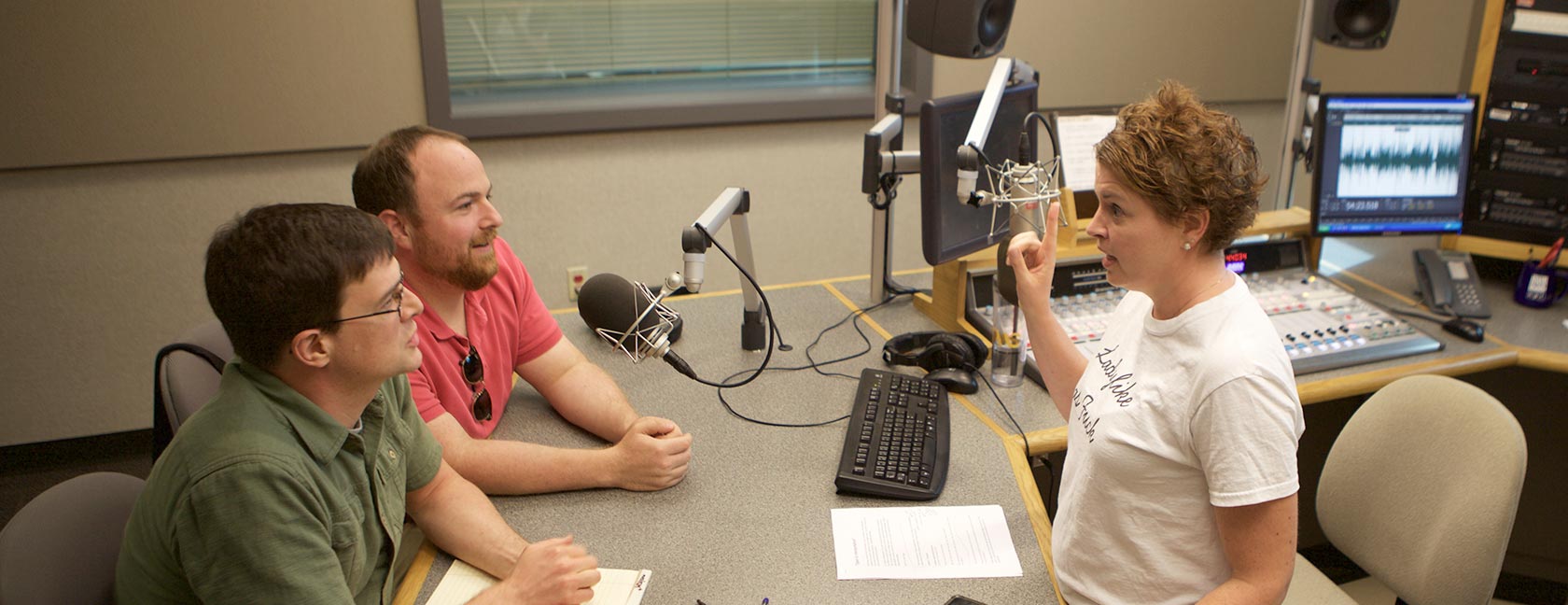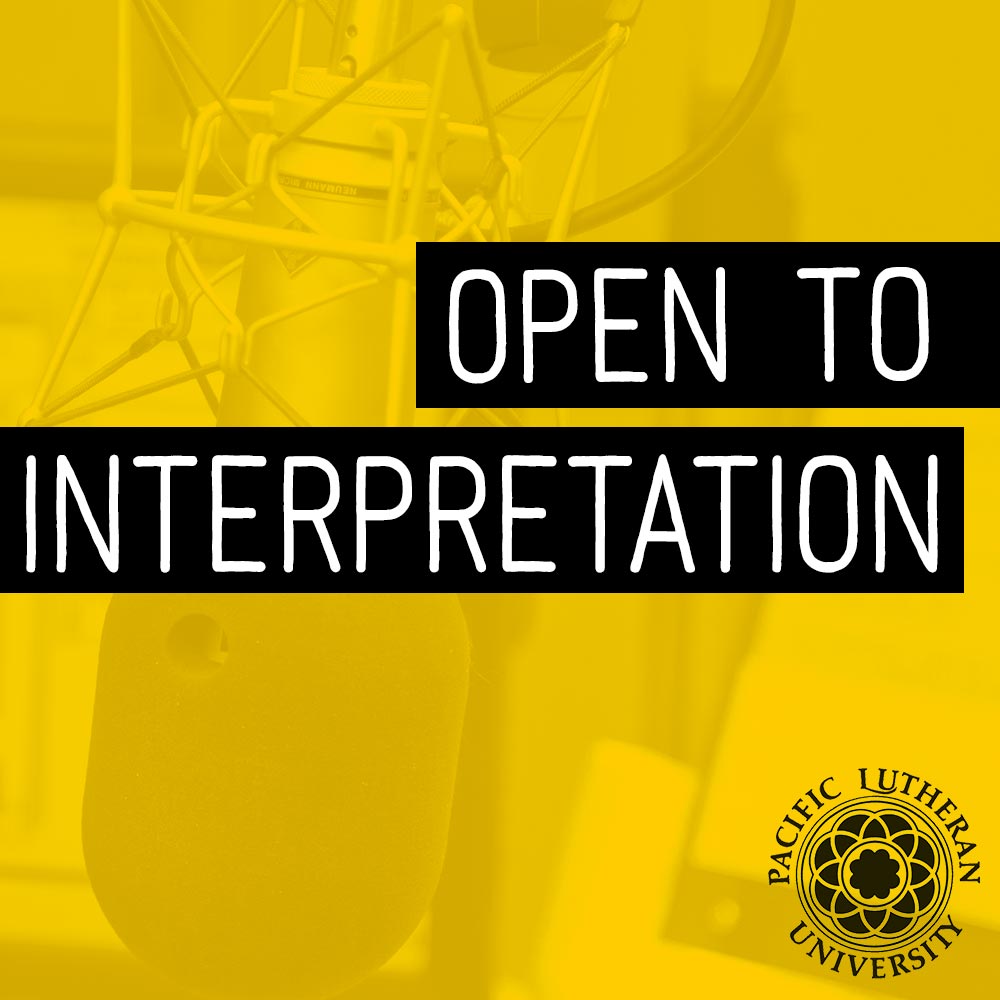Communication & Theatre Chair Amy Young Discusses New PLU Podcast Series

Image: Amy Young, Kevin O’Brien and Justin Eckstein discuss “advocacy” in KPLU’s Tacoma studio. [Photo by Zach Powers/PLU]
By Zach Powers '10
PLU Marketing & Communications
TACOMA, WASH. (August 24, 2015)- This week, PLU introduced “Open to Interpretation,” a new podcast devoted to exploring the meanings and implications of words commonly used in the news, on social media and on college campuses.
Hosted by Associate Professor of Communication Amy Young, each episode will feature unexpected pairings of faculty guests representing all corners of scholarship. Through lively dialogue and debate, “Open to Interpretation” seeks to “remind us that rarely, if ever, can a word’s meaning be reduced to a single understanding.”
The inaugural episode features a discussion of the word “advocacy” between Young, Associate Professor of Religion Kevin O’Brien and Clinical Assistant Professor of Communication Justin Eckstein.
Young, who serves as Chair of the Department of Communication & Theatre, says she has long been a consumer of podcasts and that she is hopeful that “Open to Interpretation” will welcome listeners into conversations commonly found on college campuses and in intellectual communities.
Where did the inspiration for the premise of “Open to Interpretation” come from?
When I was in graduate school, the only required course in our entire curriculum for the Ph.D. was a Friday afternoon seminar/introduction to the department/introduction to the field. Each week, the faculty member in charge of the class would pick a topic that was “hot” in communication, and ask two other faculty members to discuss the topic from their respective theoretical or methodological or practical standpoints—for instance, “activism” or “engagement” or “campaigning” or whatever. The idea was to let graduate students see how scholars approach a topic and to watch them debate it collegially. Following the one-hour Friday seminar, we (the graduate students) would go to the dive bar across the street, the Hole in the Wall, and have what we called “After Words” which was basically a casual continuation of the seminar discussion.
What do you hope this podcast will accomplish?
To become famous and have John Oliver ask me to come on his show, of course. Given that is highly unlikely, what I hope to accomplish is a sort of public model of intellectual engagement. Scholars tend to write for the priesthood, to have our work circulate only among other experts in our own disciplines.
By bringing together smart people from multiple disciplines, I think this podcast demonstrates the value and impact of engagement around ideas that touch our communities. Also, I want scholars to try and speak to and for non-experts, and I want to ask them to talk about something that may not be in their research wheelhouse. I think it helps us hone ways to take our work public, to communicate relevance and to open lines of communication with other communities and audiences.
Do you think faculty members will welcome the opportunity to be guests?
I hope people will want to come and do the podcast with me. I can imagine some might feel hesitant about doing a podcast in general or hesitant that I’m trying to stump them. I’m not, at all. This only goes well if we have a sort of rhythm and conversationality.
How does hosting this podcast relate to your scholarship?
I have written quite a lot on intellectual engagement, public intellectuals and activism—I think there is a sense that to do political or social engagement is somehow antithetical to the academic project or disposition. A sense that we are to remain detached (thanks, Plato!), that we’re supposed to recuse ourselves from public life because we’re devoted to the life of the mind.
But, I argue that is dangerous and myopic—university faculty have a unique platform by virtue of our position and perception, and we ought to use it to shape public life in positive ways. The podcast is an accessible way to talk about things that matter to people who are not fortunate enough to be sitting in our classrooms or aren’t interested in reading our books or journal articles or papers. It is a way to have discursive circulation outside the ivory tower. I think PLU has that kind of ethos and I think faculty will be excited by this opportunity.
Do you listen to podcasts, and if so which ones? Also, why do you think the simple podcast model of two to four people having an interesting conversation has become so successful?
I do listen to podcasts. I particularly like “Dinner Party Download” and “Call Your Girlfriend” (if you haven’t heard “This Week in Menstruation,” you are missing out). I think the reason the 2-4 people having a conversation model has captured so much attention is likely because a small handful of people is a perfect size to facilitate a conversation where people actually get to participate relatively equally, to be heard and to hear from others.
If you don’t have visual cues, you really don’t want a cast of thousands—it’s messy, it’s overly complex and it’s too hard to follow. And, I think you can be strategic with two to four people in terms of finding a few people who have a kind of beautiful, easy chemistry. Managing personalities is integral, I think, to this kind of podcast format.



